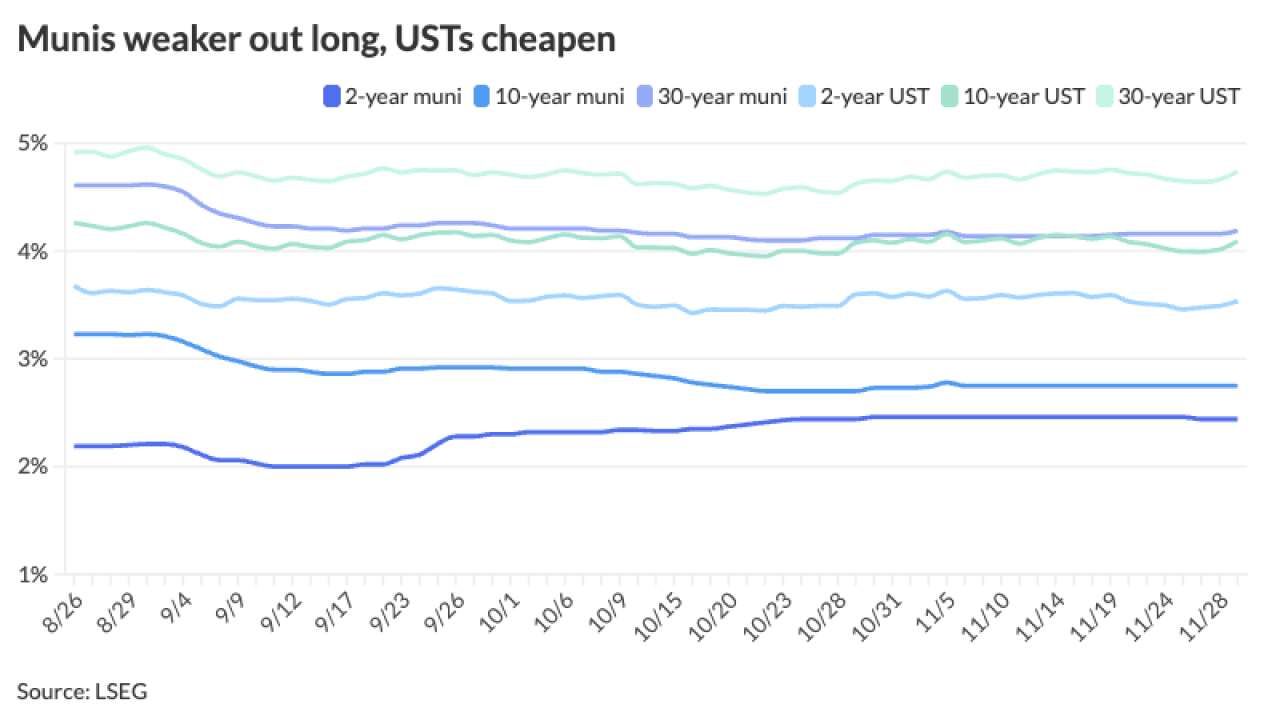
WASHINGTON – Puerto Rico officials and observers of the commonwealth's $70 billion debt crisis are concerned about a draft legislative proposal to help the territory and are waiting for the final draft, which is to be issued by a House committee on Tuesday.
The draft from the House Natural Resources Committee, which has been widely circulated since late last week, is called the Puerto Rico Oversight, Management, and Economic Stability Act. It would delegate almost all of the powers needed to help Puerto Rico to a presidentially appointed oversight board.
The bill would also halt litigation on Puerto Rico's debt from Dec. 18, 2015 to 18 months past the date of enactment of the legislation.
Sources differ as to extent the draft will be changed before its release on Tuesday but all agree that changes will likely to be made to it as it makes its way through the House.
Critics warn the bill would impose an overly powerful board that threatens Puerto Rico's autonomy while not doing enough to address Puerto Rico's need to restructure its debt and grow the economy.
As written, the bill would take months to implement and would not do anything to avoid commonwealth defaults on a $422 million debt payment due May 1 and a $2 billion payment due on July 1.
The board would have the power to issue bonds and notes as well as the sole ability to file a petition for restructuring on behalf of the commonwealth or its public entities. It would approve and require implementation of the commonwealth's budgets and other recommendations for government operations even if there is opposition from Puerto Rico's elected officials.
Resident Commissioner Pedro Pierluisi, Puerto Rico's representative in Congress, said in a release on Saturday that he is especially concerned about the expansive powers the board would have when working with Puerto Rico to follow a stated fiscal plan and budget for each fiscal year. He said he doubts the board would ever exercise the power to implement the recommendations unilaterally, but added that it should not even have the power to do so.
Pierluisi also said the debt restructuring section in the draft "requires some modifications, but is a promising start." The resident commissioner had already sent Natural Resources Committee chair Rob Bishop, R-Utah, 50 comments on the draft by Saturday and said he plans to send him more in the future.
Pierluisi said any draft released "must establish a reasonable process that encourages fair and equitable restructuring agreements to be enforced in a court of law."
Despite saying there are some positives in the Republican draft, Puerto Rico Gov. Alejandro García Padilla harshly criticized it, echoing widespread Puerto Rican sentiments.
He said that the draft "recognizes the need for extensive debt restructuring." But he added that "the rule of law on relations between Puerto Rico and the United States does not allow nullifying the constitution of the commonwealth to concentrate power in an unelected body by Puerto Ricans."
"If legislation like that were approved, Puerto Rico would challenge it immediately in federal courts and before the community of nations," García Padilla said. Such a challenge would be heard in the District Court for the District of Columbia, according to the draft.
He added that having a control board restructure the debt would be the "killing of Puerto Rican democracy" and that allowing only the control board to authorize a debt restructuring is "dishonorable and degrading."
García Padilla is a leader of the Popular Democratic Party, which advocates that Puerto Rico retain its current commonwealth status. Puerto Rico House of Representatives Minority Leader Jenniffer González Col-n said the Republican proposal "lays bare the colonial nature of the so-called 'commonwealth,' stripping it of its last ragged remaining appearances of power."
González Col-n is a leader of the New Progressive Party, which advocates statehood for Puerto Rico. Despite the backlash, Daniel Hanson, an analyst with Height Securities, said that the overall idea of the proposal could work if significant technical changes to the restructuring and other portions are made as the bill moves through Congress. He said in written commentary on Monday that the proposal is "attempting to appease anti-Chapter 9 members with a structure that materially impairs creditor rights and sets bad precedent for future proceedings."
The Natural Resources Committee's movement toward a bill follows months of hearings and discussions in Congress on Puerto Rico's financial condition. House Speaker Paul Ryan, R-Wis., told reporters that the committee will hold a hearing on the draft after members return from Easter recess, likely on April 13. The committee would then hold a vote on the bill the next day.
Under the draft being circulated, the U.S. president would appoint five individuals for three-year terms. The members, two of which would have to either have a primary residence or place of business in Puerto Rico, would have to have knowledge and experience in finance, management, law, or business or government operations. They could not be elected officials or employees of Puerto Rico's government. Additionally, they could not provide goods or services to Puerto Rico's government or be related to someone who does.
The members would not be compensated but would have the power to select an executive director and staff that could receive compensation. The board could also employ a chief management officer, who would report to the executive director, to oversee certain areas of the oversight board's jurisdiction, like Puerto Rico's governmental departments and other governmental functions.
Pierluisi said the chief management officer the board could employ "seems to cross the line from 'macromanagement' to micromanagement."
The draft requires that the Puerto Rico government submit a fiscal plan for at least a five year period to the board for approval as well as the budget for each fiscal year during the oversight period. If the board determines that a budget from the legislature or governor does not align with the fiscal plan, it would send the budget back with revisions. Both the governor and legislature would have until the end of an agreed upon timeline to file as many revisions to their proposal as they like. However, if at the end of the time period the board has not approved the submitted budget, the oversight board's budget proposal would be deemed approved and effective on the first day of the relevant fiscal year.
The draft would require Puerto Rico's government to make a dedicated funding source to help finance board operations. It also leaves open the possibility of a congressional appropriation. The board would be able to nullify any legislation Puerto Rico's government passes if it does not fit into an agreed upon fiscal plan for the commonwealth.
Much of the discussion in Congress regarding possible solutions to Puerto Rico's situation have centered on combining an oversight authority and debt restructuring, with Democrats largely pushing broader debt restructuring and Republicans backing a more powerful authority.
The draft avoids changing Chapter 9 bankruptcy law, which allows a state's public authorities to restructure its debts, and instead uses the U.S. Constitution's Territorial Clause to apply the proposal to Puerto Rico.
It aims to allay creditor concerns by requiring that a debtor engage in voluntary restructuring discussions before filing of a restructuring petition. It would cater to a frequently cited Republican complaint by requiring Puerto Rico to have released its audited financials for the most recent fiscal year before restructuring petitions could be filed in the federal district court in Puerto Rico.
The provision halting litigation has been a main component of several bills from Democrats in the past.
Additionally, the draft lays out a method for the board to study Puerto Rico's public pension system, which has $46 billion in liabilities and only $2 billion in net assets. It would authorize a "revitalization coordinator" under the board that would facilitate project proposals to improve the commonwealth's infrastructure and economic health.





